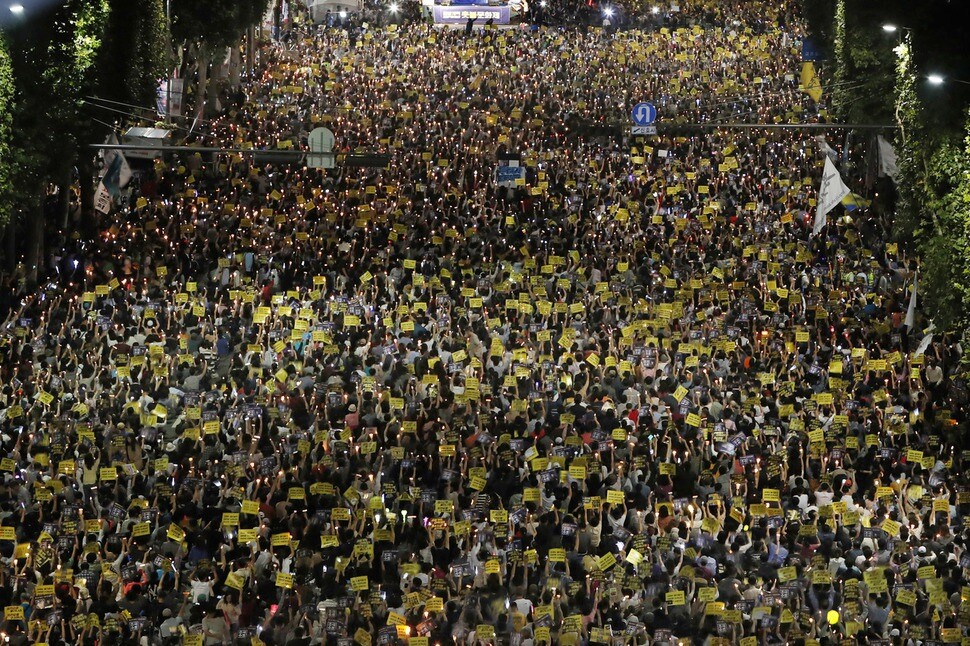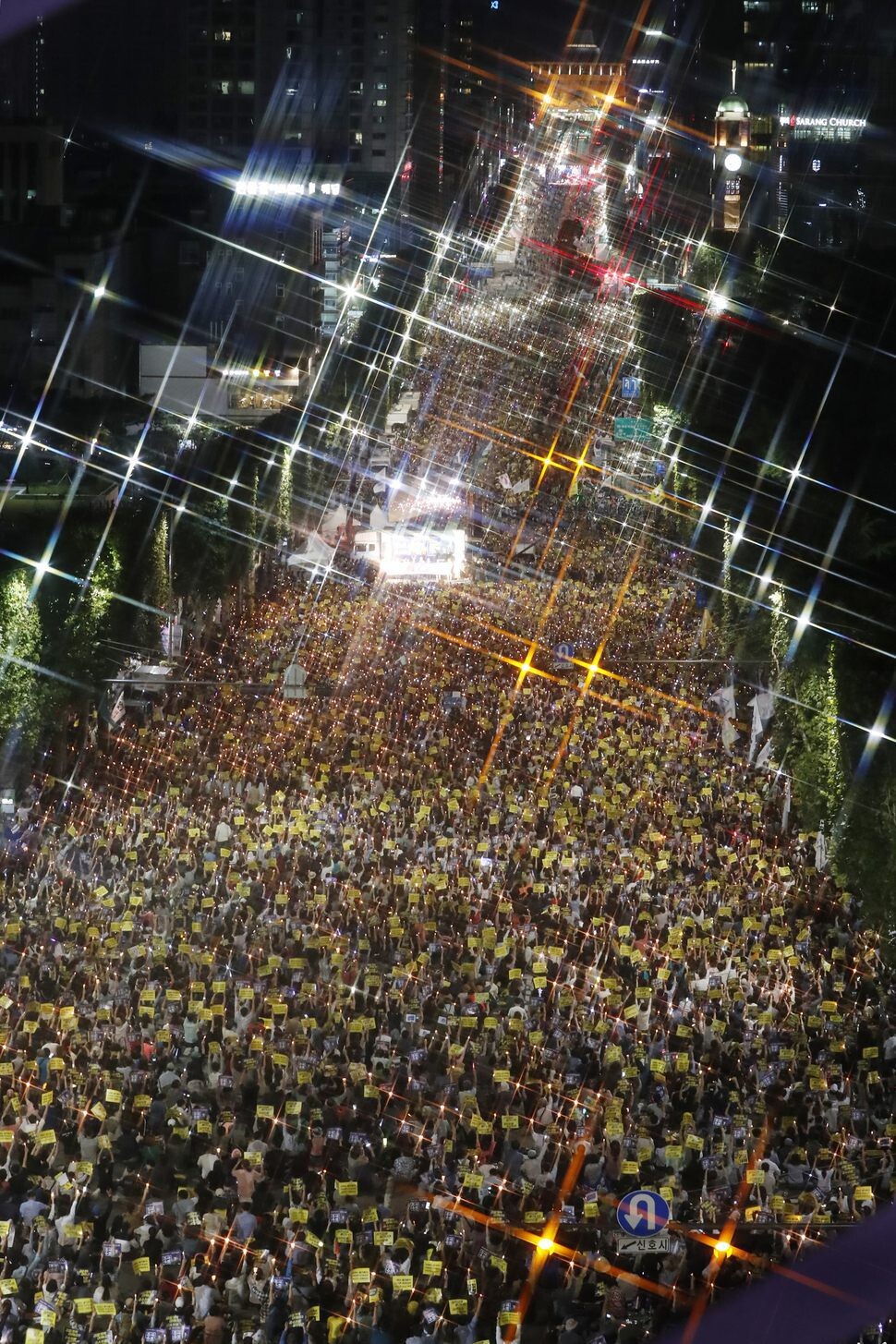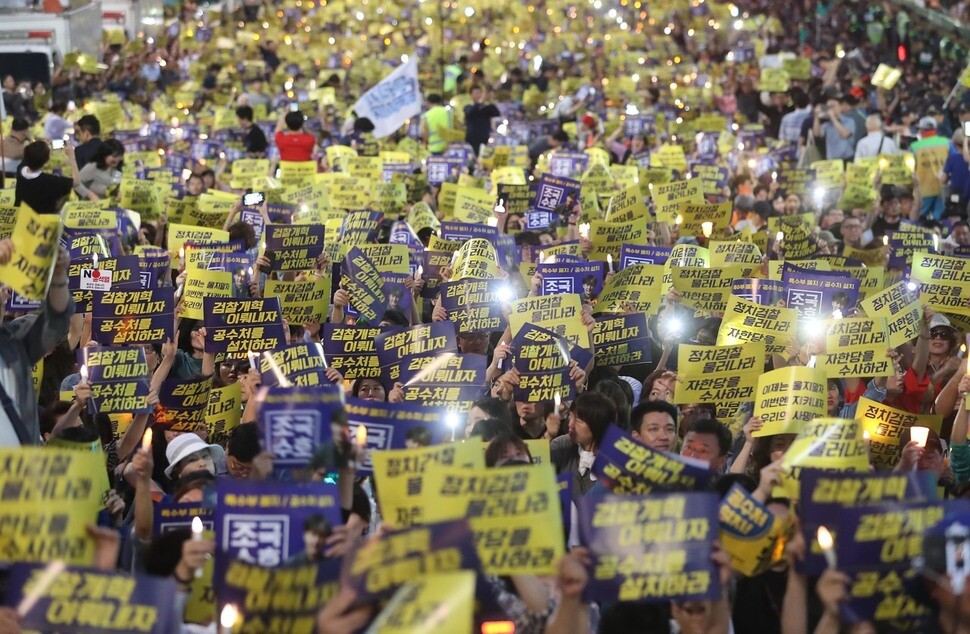hankyoreh
Links to other country sites 다른 나라 사이트 링크
[News analysis] The unexpected turnout of the candlelight rally for prosecutorial reform

“I’m looking over the entire process. I need to find out where I went wrong,” said a first-term lawmaker with the Democratic Party.
The lawmaker was talking about the candlelight rally for prosecutorial reform that was held around Banpo Street in Seoul’s Seocho neighborhood near the Supreme Prosecutors’ Office on the evening of Sept. 28.
“I’d noticed an unusual mood in my district since last week, but I had no idea so many people would attend the rally,” said the lawmaker, who’d opposed Cho Kuk’s appointment as Minister of Justice. “I’m curious to see how many people show up for next week’s rally.”
The organizers of the rally estimate that between 1.5 and 2 million people attended the rally on Saturday, far more than expected.

The rally on Saturday was unusual in several respects. For one thing, there were no hints or indications that it would be so big.
“There have been large-scale candlelight rallies several times since 2002, but they’ve typically taken four to six weeks to build up energy, and that process has been covered in detail by the press. This is the first time in the history of candlelight rallies that so many people have assembled so suddenly,” said Shin Jin-uk, a professor of sociology at Chung-Ang University, during a telephone interview on Sept. 29.
The rally on Saturday was comparable in scale to the candlelight rallies pushing for the impeachment of former President Park Geun-hye in 2016, but it’s unclear whether moderates took part in this rally, as they did during the impeachment drive.
“Did this rally bring out disappointed moderates, or was it organized to bring out the base? That’s an important question, and based on the results of recent surveys, the focus seems to have been on the base,” said Chung Han-ul, a public opinion analysis advisor for Hankook Research.
In an opinion poll conducted by KBS Sunday Diagnosis Live on Sept. 26-27, 41% of respondents thought the investigation into Cho and his family had gone too far, while 49% thought it hadn’t.
But among supporters of the ruling Democratic Party, at least, experts agree that the prevailing view is that the prosecutors’ investigation has become excessive. The mere feeling that an investigation has gone too far is qualitatively different from actually going to a rally to express that dissatisfaction, experts say.
“The idea that the prosecutors really crossed the line when they leaked Cho’s status as an official suspect has become the dominant narrative,” said Choe Jin-bong, a professor of journalism and broadcasting at Sungkonghoe University.
Despite their discomfort with how the scandal was playing out, some supporters of the Democratic Party had been reluctant to express their position out of disappointment over Cho Kuk’s ethical lapses. But growing criticism of the prosecutors for crossing the line in their investigation and the larger cause of prosecutorial reform has given those supporters an excuse to take action. “The 11-hour raid on Cho’s house was the turning point. The prosecutors really shot themselves in the foot there,” one pundit said.
South Korean President Moon Jae-in’s message to the prosecutors may also have helped jolt his supporters into action. On Sept. 27, the day after Moon returned to South Korea following his speech at the UN General Assembly and his summit with US President Donald Trump, he had Blue House Spokesperson Koh Min-jung hold a briefing in which she voiced the importance of the prosecutors exercising their authority with restraint and with respect for human rights. From the point of view of Moon’s supporters, that could be viewed as an endorsement of Cho Kuk in his showdown with Prosecutor-General Yoon Seok-youl.

Witnessing the power of the prosecutors to rattle the elected government
Other analysts think that the public is feeling threatened by the prosecutors, whose power they have experienced during a national shakedown that has lasted for more than a month. “While there were many people who agreed with Moon that investigators shouldn’t go easy on the people in power and that allegations against Cho ought to be investigated, seeing the prosecutors’ recent behavior has got more people thinking that there need to be public checks and balances on law enforcement,” said Shin Jin-uk. According to Shin, public opinion reached an inflection point when the prosecutors’ actions went beyond a no-stones-left-unturned investigation of sitting officials and started to look like defiance of the president’s power of appointment.
“Most of the candlelight rallies in the 2000s derived from the belief that corruption by elected officials needed to be countered according to the principle of the rule of law. But this was the first candlelight rally that was held to put a check not on the elected government but on an unelected government body, namely the prosecutors,” Shin said.
A source in the Democratic Party expressed similar sentiments. “Over the past month, the prosecutors have themselves put prosecutorial reform at the head of the agenda. At least among supporters [of the Democratic Party], that has emerged as the top priority for reform.”
Another likely factor is that the people who gained a political victory through the candle rallies in 2016 regard the Cho scandal as a rejection of that victory. Jang Deok-jin, a professor of sociology at Seoul National University who has analyzed online big data from the 2016 rallies, focused on the continuity between the rallies calling for Park’s impeachment and the rallies calling for prosecutorial reform.
“Analyzing big data from that time shows that the word ‘candlelight citizen’ came into predominant use as time passed. That marked the creation of actors with the new identity as ‘candlelight citizens,’ and their greatest demand was ‘eliminating deep-rooted evils.’ Those ‘candlelit citizens’ seem to have been mobilized once again as a consensus forms that the prosecutors, who were regarded as one of the main ‘deep-rooted evils’ to be dealt with, are brandishing their authority in a way that undermines democracy,” Jang said.
A politically targeted investigation by the prosecutors, the leaking of information about the people being investigated, and the press’s uncritical publication of such information led to the tragic death of former president Roh Moo-hyun in 2009. The trauma lingering from those events is regarded as another factor in mobilizing the Democratic Party’s base.
“Roh’s death 10 years ago is part of the collective memory, and there’s a collective commitment not to let prosecutors target political enemies again. People are still dealing with the psychological trauma of Roh taking his own life because of the unchecked power of prosecutors, and the prosecutors’ organized resistance against reformation this time around has caused the people to pick up their candles once again,” said Han Hong-gu, a professor in the liberal arts department at Sungkonghoe University.
But there is also concern that the rallies will only consolidate the ruling party’s traditional base of supporters, without bringing in the moderates or the pure progressives. “The focus is prosecutorial reform, though there’s some overlap with defending Cho Kuk. The rally in the Seocho neighborhood shouldn’t be mistaken as being held in defense of Cho,” said a source in the Democratic Party.
If the rally is misunderstood as having been organized to protect Cho so that he can carry out prosecutorial reform, the source said, the conservatives are likely to use that to their advantage.
By Kim Won-chul, Lee Ju-hyeong, Lee Yu-jin, and Kim Min-je, staff reporters
Please direct comments or questions to [english@hani.co.kr]

Editorial・opinion
![[Column] Has Korea, too, crossed the Rubicon on China? [Column] Has Korea, too, crossed the Rubicon on China?](https://flexible.img.hani.co.kr/flexible/normal/500/300/imgdb/original/2024/0419/9317135153409185.jpg) [Column] Has Korea, too, crossed the Rubicon on China?
[Column] Has Korea, too, crossed the Rubicon on China?![[Correspondent’s column] In Japan’s alliance with US, echoes of its past alliances with UK [Correspondent’s column] In Japan’s alliance with US, echoes of its past alliances with UK](https://flexible.img.hani.co.kr/flexible/normal/500/300/imgdb/original/2024/0419/2317135166563519.jpg) [Correspondent’s column] In Japan’s alliance with US, echoes of its past alliances with UK
[Correspondent’s column] In Japan’s alliance with US, echoes of its past alliances with UK- [Editorial] Does Yoon think the Korean public is wrong?
- [Editorial] As it bolsters its alliance with US, Japan must be accountable for past
- [Guest essay] Amending the Constitution is Yoon’s key to leaving office in public’s good graces
- [Editorial] 10 years on, lessons of Sewol tragedy must never be forgotten
- [Column] A death blow to Korea’s prosecutor politics
- [Correspondent’s column] The US and the end of Japanese pacifism
- [Guest essay] How Korea turned its trainee doctors into monsters
- [Guest essay] As someone who helped forge Seoul-Moscow ties, their status today troubles me
Most viewed articles
- 1[Column] The clock is ticking for Korea’s first lady
- 2Samsung barricades office as unionized workers strike for better conditions
- 3[Correspondent’s column] In Japan’s alliance with US, echoes of its past alliances with UK
- 4After 2 months of delayed, denied medical care, Koreans worry worst may be yet to come
- 5[Column] Has Korea, too, crossed the Rubicon on China?
- 6Hong Se-hwa, voice for tolerance whose memoir of exile touched a chord, dies at 76
- 7US overtakes China as Korea’s top export market, prompting trade sanction jitters
- 8All eyes on Xiaomi after it pulls off EV that Apple couldn’t
- 9[Photo] Smile ambassador, you’re on camera
- 10[News analysis] After elections, prosecutorial reform will likely make legislative agenda